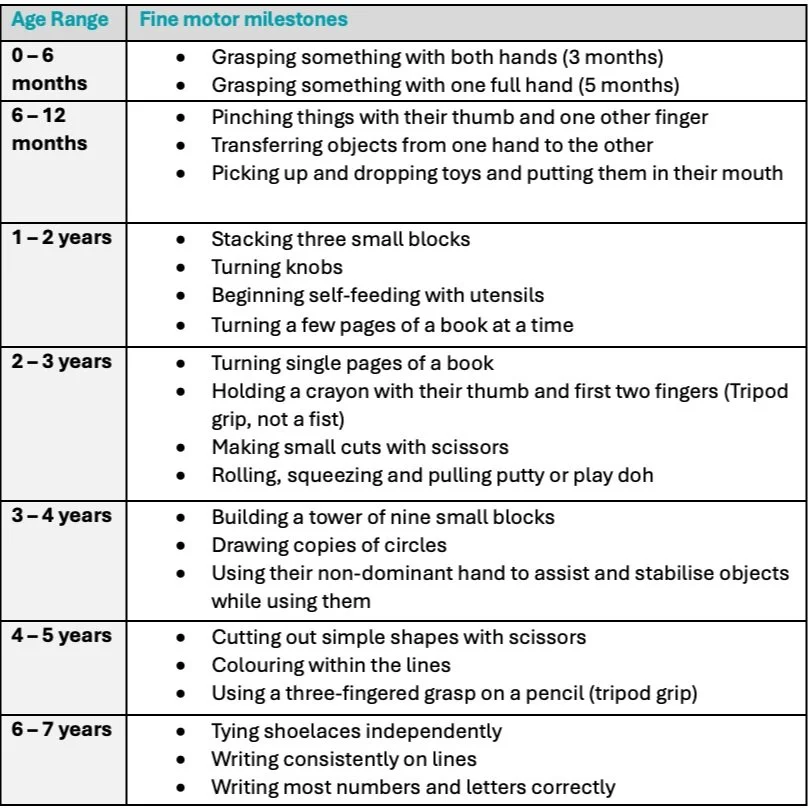Hands-on Heroes
Unlocking Fine Motor Petential in Early Chilhood Developement
What are Fine Motor Skills?
Fine motor skills refer to our ability to use the little muscles in our hands and wrists. It’s how we do almost everything in our life and it’s a key part of almost every one of our daily activities. These tiny movements come naturally to a lot of people, and we usually don’t think about just how important they really are. Fine motor skills are complex and involve a close relationship between our physical, sensory and cognitive abilities. For this reason, fine-motor skills are vital in a child’s development and crucial in creating independent little people!
Why are Fine Motor Skills Crucial for Childhood Developement?
Fine motor skills can be one of the trickiest things for children to develop, but when they do it helps them become independent superheroes in school and everyday life! These nifty skills lay the groundwork for doing all sorts of activities. They are central in our ability to feed ourselves, get dressed, and complete school or work tasks like writing and typing. Not only that, but as kids practice their fine motor magic, they’re also leveling up their brains. When they learn to manipulate objects just right, they’re boosting their problem-solving skills, sharpening their focus, and learning more about the world around them. So, developing fine motor skills isn’t just about being able to tie shoelaces or colour in the lines; it’s also a key ingredient in life for young people to develop independence, become successful in school, and unleash their inner genius!
The Journey of Motor Skill Developement in Early Childhood
Motor skill development is an exciting adventure that unfolds gradually during early childhood. It all begins with sensory explorations, where little ones discover the world around them through activities like tummy time, crawling, and playful movement. These experiences help build their strength, coordination, and positional awareness, laying the groundwork for future skills.
As children grow, fine motor skills come into play. These skills are essential for hand-eye coordination, which plays a vital role in early literacy. Engaging in activities like puzzles, arts and crafts, and using small tools allows kids to practice and refine their fine motor control. When they have plenty of opportunities to explore these activities—along with guidance and feedback from adults—they build proficiency, confidence, and a sense of control.
Encouraging these playful experiences not only enhances motor skills but also sets the stage for a lifetime of learning and exploration. So, let’s celebrate every little milestone on this amazing journey!
How do I know if my child’s fine motor skills are delayed?
If your child is experiencing significant delays in the following milestones, they may require extra support to develop their fine motor abilities
What does early intervention for fine motor skills look to address?
Developmental Foundations: Fine motor skills are essential for many everyday tasks, like writing, buttoning clothes, and using utensils. Early intervention helps establish a strong foundation for these skills.
Preventing Delays: Addressing difficulties early can prevent further delays in skill development, which can impact a child's confidence and independence.
Cognitive Development: Fine motor skills are linked to cognitive processes. Engaging in activities that enhance these skills can also boost problem-solving and hand-eye coordination.
Social Skills: Many fine motor tasks involve group activities, like playing with toys or participating in arts and crafts. Improving these skills can enhance social interactions and teamwork.
Long-Term Outcomes: Early support can lead to better academic performance and increased self-esteem as children gain the ability to perform tasks independently. By providing targeted support and resources early on, we can help children reach their full potential in fine motor skills and overall development.
How can I support my child’s fine motor skills at home?
1. Play with Small Objects
- Puzzles: Choose age-appropriate puzzles to encourage manipulation and problem-solving.
- Building Blocks: Stacking and arranging blocks helps improve hand-eye coordination.
2. Arts and Crafts
- Cutting and Gluing: Provide safety scissors and glue sticks for creative projects.
- Drawing and Colouring: Offer crayons, markers, and coloured pencils to encourage grip and control.
3. Play Dough and Clay
- Encourage squishing, rolling, and shaping play dough to strengthen hand muscles and improve dexterity.
4. Fine Motor Games
- Beading: Stringing beads onto a string or pipe cleaner can enhance precision.
- Tweezers and Tongs: Use these tools to pick up small objects or pom-poms for a fun challenge.
5. Everyday Activities
- Dressing: Let your child practice buttoning, zipping, and tying shoes.
- Cooking: Involve them in simple cooking tasks, like stirring or measuring ingredients.
6. Encourage Writing and Drawing
- Provide a variety of writing tools and surfaces, like chalkboards, notebooks, and large paper.
7. Outdoor Play
- Activities like climbing, swinging, and playing in the sand help develop overall strength and coordination including grip strength and hand dexterity.
8. Sensory Play
- Engaging activities like playing in a sand pit that involves stimulating your child’s different senses and integrating this into tactile and physical feedback is important for allowing their body to work together to complete activities.
9. Be Patient and Provide Feedback
- Celebrate their efforts and provide gentle guidance. Positive reinforcement goes a long way!
10. Make It Fun!
- Keep activities enjoyable and varied to maintain your child's interest and enthusiasm.
Hands-on Hereos by Patrick Thomson


